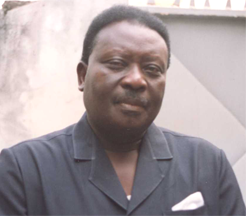|
 Malapet, Nino (Jean Dieudonné),saxophonist and band leader; born Brazzaville, Mar. 8, 1935. Malapet, Nino (Jean Dieudonné),saxophonist and band leader; born Brazzaville, Mar. 8, 1935.
Malapet got a taste of music from his uncle Emmanuel Dadet, a Brazzaville intellectual who led the pioneering band Melo-Congo. As a schoolboy—Malapet took five years of his primary and secondary schooling in France, finished in Brazzaville, and went on for two years of law school—Malapet learned guitar from another guitarist and then began to pick up the saxophone. Toward the end of 1954, together with clarinetist Jean Serge Essous, and singers Edo Ganga and Célestin Kouka, he formed the band Negro Jazz.
Soon afterward the band crossed the Congo River to Kinshasa (Léopoldville) where Malapet signed with the Ngoma recording studio. Seeing most of his fellow Brazzavilleans catching on at rival Loningisa, he spent the next two years as a disenchanted session musician trying to break his contract. Once free he joined the new Esengo studio where he helped form the band Rock'a Mambo with Essous, singer Philippe "Rossignol" Lando, conga drummer Saturnin Pandi, and guitarist Papa Noel. Malapet's "Micky Me Quiero" (Micky loves me, in Spanish) became the first song recorded by another budding star, Tabu Ley Rochereau.
When it became clear in 1959 that the two Congos were soon to become independent republics, Malapet, Essous and other Brazzavilleans working in Kinshasa began to rehearse a new band in secret. The group, Orchestre Bantou (later called Bantous de la Capitale) made its debut back home in Brazzaville in August of 1959, although Malapet, still obligated to Esengo and Rock'a Mambo, didn't perform with the band until the end of 1960. From that point on his career was tied to Orchestre Bantou.
Malapet composed songs on occasion, but his principal contributions to the band came as its leader and chief saxophonist. He took charge when Essous left in 1966 and led the band through many of its most productive years. The hits were often written by others, but none was complete without Malapet's horn. He played with an economical touch, just enough to color the mix with a solo riff or in chorus with another horn.
Although Essous returned to Les Bantous in 1971, Malapet continued as leader, presiding over the tumultuous seventies and eighties when defections plagued the band and opportunities to perform diminished. In 1986, with the band in a severe state of disrepair, Malapet moved up to president of its board while being replaced as day-to-day leader by Pamelo Mounk'a. Malapet resumed leadership when Pamelo fell ill toward the end of 1988, but more defections and Congo-Brazza's political turmoil prevented any meaningful work.
As leader, Malapet guided Les Bantous through its most prosperous and most disastrous eras, neither solely his doing. Much of the success of the late sixties and early seventies sprang from the band's wealth of talent and the era's relative prosperity. Success fostered petty jealousies and problems of money management, both of which garnered criticism for Malapet. His saxophone playing gained broader approval. Although he was not a great improviser, his steady riffing added a pleasing counterpoint to the band's dominant guitars.
© 2011 Gary Stewart
SELECT DISCOGRAPHY
With Rock'a Mambo: African Memories (Path‚ Marconi LP C062-15136) 1959 & 1960 recordings.
With Bantous de la Capitale: Les Bantous de la Capitale (Sonodisc CD36527) sixties recordings reissued 1993; La Belle Epoque (vol. 1 Glenn GM324001) sixties and seventies recordings reissued 1994; Rosalie Diop (Sonodisc CD36569) sixties and seventies recordings reissued 1997; Les Bantous de la Capitale (Sonodisc CD36584) seventies recordings reissued 1997; Compilation Musique Congolaise (Sonodisc CD36591) sixties recordings reissued 1998; Makambo Mibale (Sonodisc CD36592) sixties and seventies recordings reissued 1998.
For a discography of the band Rock a' Mambo: http://www.muzikifan.com/rockamambo.html
SELECT BIBLIOGRAPHY
M. Lonoh, Essai de commentaire sur la musique congolaise moderne (Kinshasa, 1969); S. Bemba, 50 ans de musique du Congo-Zaire (Paris, 1984); G. Stewart, Rumba on the River (London and New York, 2000).
|

